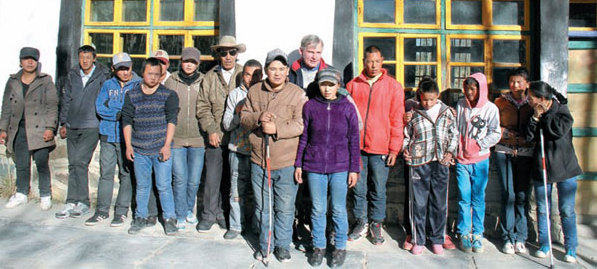
|
Ten years ago, Mike Parent arrived in the Tibet autonomous region to teach at the Braille Without Borders vocational school. Palden Nyima finds out why the Canadian intends to stay here until the end of his days. The sky stretched out clear and bright above our heads as we approached the remote village nestled among willows and fields high in the mountains. There was the laughter of children and the smell of butter tea as we arrived at the school we had arranged to visit, which was easy to spot, as "Braille Without Borders" was written conspicuously on a wall in three languages. The man we have come to interview, a Canadian who has lived here for almost 10 years, and who intends to be buried here, warmly welcomed us with the traditional Tibetan greeting, "tashidelek", and cups of tea. When Mike Parent first came to Baishung township in Xigaze prefecture in the Tibet autonomous region to teach at the Braille Without Borders vocational school, the children called him an old monkey because of his hairy arms. Now, after almost a decade of "being together 24 hours a day, seven days a week", the 70-year-old is called "chigyal pola" - which means "foreign grandpa". "At the beginning they called me here because they needed me. Now 10 years later they don't need me, they want me to stay because they love me," he says. It was a chance encounter that brought Parent to Baishung. He met Sabriye Tenberken, the German woman who co-founded Braille Without Borders, when he was studying the Tibetan language and culture at Tibet University from 1998 to 2000. He started by aiding the school financially, but when she asked him if he would be interested in teaching organic farming to visually impaired people in Tibet, Parent immediately agreed. In 2005, he started showing how to plant vegetables and crops on a very small piece of land. According to Parent, with 1-square-meter of land, visually impaired people need only to stretch out their hands to cultivate and harvest vegetables. The school has six greenhouses for planting crops, and 12 mini greenhouses that they use for teaching. And Parent also teaches the students how to produce organic fertilizer. "We feed 100 people three meals a day ourselves," says Parent proudly. According to official statistics, 30,000 of the 2.5 million inhabitants of the Tibet autonomous region are visually impaired. Compared to most areas in the world, this is well above the average ratio. "Before I came to the blind village, I had never seen the brighter world. I am happy here because I found equality here," says Tsering, 35, from Tibet's Shannan prefecture, who lost his sight four years ago. Parent says many adult visually impaired people such as Tsering really love the community and are reluctant to leave. "It is one of our difficulties. The donors don't want it to be a retirement home for blind people. But after they have learned how to make bread and it is time to leave, they find it hard to say goodbye." But he says the purpose of the vocational center is to improve the students' self-esteem and help them become contributing members of society. Teaching organic farming is just one of the things Parent does at the vocational school. He also teaches animal husbandry and every evening after supper, he teaches English. He is also a fitness coach to the children. Every morning, he gets up early and opens the gym and takes the visually impaired children through some exercises and teaches them to use the various sports equipment available. "Most of them are still young, they need to move frequently. I don't want to see them sitting in a corner all the time," he says. Such dedication is appreciated by the students and those who work with him. "Parent always thinks about others," says Ardon Ngawang Drolma, 38, the school principal. "He spends all his money on others and doesn't have any savings. Once, I found he only had 10 yuan ($1.63) in his pocket." "He told us simply one day that we should bury him on top of the hill after he died," she adds. "That is unforgettable." "They can live without me, but I think I cannot live without them. In my heart, they are part of my family," Parent says. When the interview ended, with his rough chapped hands, he shook hands with us, a big smile on his face. By Palden Nyima ( China Daily) |
日喀則邊雄鄉(xiāng)位于距拉薩250多公里的雅江左側(cè)一座小山腳下,山腳下有個(gè)不起眼的藏族小村莊,很難想象這個(gè)偏僻的小村莊里竟然有所盲文無(wú)國(guó)界組織技能培訓(xùn)學(xué)校。 當(dāng)本報(bào)記者到達(dá)這里時(shí),孩子們純真的歌聲和醇香的酥油茶味從一個(gè)落滿黃葉的大院中隱隱傳來(lái)。一位精神矍鑠的加拿大老人笑容可掬地說(shuō)著“扎西德勒”這句藏族最吉祥的問候語(yǔ),并獻(xiàn)上哈達(dá)前來(lái)迎接。 這位老人就是邁克·詹姆斯·帕蘭特。正是他指引一群失去光明的藏族孩子第一次開始認(rèn)識(shí)自我、第一次開始擁有夢(mèng)想、第一次觸摸到有“色彩”的生活。 70歲的帕蘭特先生說(shuō):“當(dāng)初他們請(qǐng)我到這里來(lái)是因?yàn)樗麄冃枰遥D(zhuǎn)眼十年過(guò)去,他們已經(jīng)不再需要我的幫助,但他們卻不斷地挽留我在這里,因?yàn)樗麄円呀?jīng)發(fā)自內(nèi)心的愛上了我。” 帕蘭特先生回憶起當(dāng)時(shí)剛到盲校工作的情景,孩子們對(duì)這個(gè)金發(fā)碧眼的外國(guó)人充滿好奇,不斷撫摸他手上的體毛,以及他高高的鼻子,孩子們甚至以為他是一只來(lái)自遙遠(yuǎn)國(guó)度的猴子,一直不敢親近。如今,孩子們已經(jīng)深深的愛上了這位可愛的外國(guó)老頭了。 在盲文無(wú)國(guó)界組織技能培訓(xùn)中心,帕蘭特扮演著很多重要的角色。在農(nóng)田里他是位有機(jī)農(nóng)耕推廣者;在學(xué)校里他不僅僅扮演著英語(yǔ)教師的角色,甚至身兼司機(jī)、健身教練等數(shù)職;在養(yǎng)牛場(chǎng),他是一位畜牧培訓(xùn)師,隨著時(shí)間的推移,他最終被孩子們接納,孩子們更是親切地稱他為“齊杰波拉”(藏語(yǔ)意為“老外爺爺”)。 這里海拔接近4000米,在這樣一個(gè)高寒缺氧,自然條件艱苦的環(huán)境下,究竟是什么原因讓這位加拿大老人如此不辭辛勞的無(wú)償工作,而且一待就是10年之久? 許多陌生人常常會(huì)好奇地問他究竟為什么會(huì)甘愿在一個(gè)偏遠(yuǎn)的高海拔山區(qū)默默奉獻(xiàn),對(duì)于帕蘭特而言,這既是命運(yùn)的安排,又的確是一個(gè)他從未認(rèn)真思考過(guò)的問題。 1998年至2004年,當(dāng)時(shí)在西藏大學(xué)攻讀藏學(xué)專業(yè)的他結(jié)識(shí)了盲文無(wú)國(guó)界組織創(chuàng)始人薩布瑞亞,當(dāng)薩布瑞亞得知帕蘭特是一位農(nóng)業(yè)專家后,便邀請(qǐng)他到邊雄盲校推廣有機(jī)農(nóng)耕技術(shù)。出于對(duì)薩布瑞亞的敬佩和對(duì)盲人的同情,他欣然應(yīng)邀。 自2003年開始,帕蘭特開始以募捐資金等方式資助邊雄盲校。2005年他更是親來(lái)到這所盲校,為盲人們傳授如何在小面積的土地上播種蔬菜、花草、及藥用植物,并輔導(dǎo)他們?nèi)绾沃谱魈烊环柿稀?/p> 帕蘭介紹說(shuō),“這些耕地面積只有一平方米,盲人和視力殘疾人可以站在花園外進(jìn)行播種、收割、并通過(guò)觸摸了解植物的長(zhǎng)勢(shì)。” 據(jù)帕蘭特介紹,該盲校擁有6個(gè)用來(lái)播種莊稼的溫室大棚,以及12個(gè)用于教學(xué)的有機(jī)蔬菜培植以及制作天然肥料的微型溫室大棚。 “我們用自己的雙手為100多人供應(yīng)一日三餐所用的蔬菜,”帕蘭特驕傲地說(shuō)。 為了不讓化學(xué)肥料對(duì)盲童的身體造成再次傷害,因此帕蘭特一直以來(lái)都堅(jiān)持使用有機(jī)化肥。 “這些培訓(xùn)的主要目的,是為了幫助這些孩子找到自身存在的價(jià)值,并獲得家庭和社會(huì)的認(rèn)可,”帕蘭特語(yǔ)重心長(zhǎng)的說(shuō)。 除了有機(jī)農(nóng)耕培訓(xùn)和天然化肥制作外,盲校的技能培訓(xùn)還包括卡墊編織、奶酪制作、面包烘焙、殘疾人按摩等八個(gè)專業(yè),孩子們進(jìn)入盲校后,有6到8個(gè)月的時(shí)間學(xué)習(xí)并掌握這些專業(yè)技能。 來(lái)自西藏山南地區(qū)的次仁驕傲地告訴記者,“沒來(lái)盲人培訓(xùn)中心之前,我從未想過(guò)我的生活會(huì)變得如此有意義,在這里我過(guò)得充實(shí)而幸福、在這里我同樣學(xué)會(huì)了通過(guò)勞動(dòng)自力更生,”四年前的一場(chǎng)變故讓他突然失去了視力。 帕蘭特說(shuō),像次仁這樣的盲人,一旦到了培訓(xùn)中心,就不愿回去了,因?yàn)樗麄冊(cè)谶@里學(xué)會(huì)了通過(guò)自己的勞動(dòng)證明自己的價(jià)值,并贏得他人的尊重。 “募捐者和培訓(xùn)中心的老師們不想讓這個(gè)盲人培訓(xùn)中心變成盲人退休基地,但當(dāng)我們的盲人學(xué)員們剛剛學(xué)會(huì)怎樣制作一張烙餅或其它技能后,當(dāng)他們離開培訓(xùn)中心時(shí),他們發(fā)現(xiàn)向培訓(xùn)中心的朋友們說(shuō)一聲‘再見’是如此之難”,帕蘭特說(shuō)。 每天清晨,帕蘭特都會(huì)早早起床,并打開健身房的門,帶領(lǐng)盲人學(xué)員們來(lái)到健身房鍛煉身體,并指導(dǎo)他們?nèi)绾握_的使用這些健身器材。 “他們?nèi)绱四贻p,需要通過(guò)運(yùn)動(dòng)強(qiáng)健體魄,我不想看到他們整天靜靜地呆在一個(gè)角落里一動(dòng)不動(dòng),”帕蘭特說(shuō)。 38歲的阿珍是這所培訓(xùn)中心的校長(zhǎng),她也是帕蘭特的最佳搭檔之一。據(jù)阿珍介紹,帕蘭特總是在為別人著想。“帕蘭特把所有的錢都用在別人身上,而他自己卻沒有任何存款。有一次,我驚奇的發(fā)現(xiàn)他的口袋里只有10元人民幣。” “帕蘭特曾經(jīng)告訴我們,如果有一天當(dāng)他離開這個(gè)世界時(shí),就把他的尸體埋在后面那座山上,他的愿望竟是如此簡(jiǎn)單。”對(duì)于阿珍來(lái)說(shuō),這是一件難忘的回憶。 “現(xiàn)在他們沒有我也可以生活,但此刻我在想,如果沒有他們,我將面對(duì)怎樣的生活,因?yàn)樗麄冊(cè)缫雅c我親如一家人,”帕蘭特說(shuō)。 功夫不負(fù)有心人。據(jù)阿珍校長(zhǎng)介紹,如今,在帕蘭特和同事們的努力下,盲校的很多孩子都考入了普通學(xué)校。“在日喀則地區(qū),我們有30個(gè)盲人學(xué)生,他們分布在各個(gè)學(xué)校,其中的4個(gè)孩子順利地考上了大學(xué),他們的成績(jī)甚至超過(guò)了一些視力正常的學(xué)生。” 帕蘭特于2013年獲得中國(guó)政府頒發(fā)的“友誼獎(jiǎng)”,這一獎(jiǎng)項(xiàng)頒發(fā)給了來(lái)自20個(gè)國(guó)家的50位專家。當(dāng)提到如何看待他獲得的“國(guó)際友誼獎(jiǎng)”這個(gè)榮譽(yù)時(shí),他謙虛地說(shuō)這個(gè)獎(jiǎng)項(xiàng)不僅僅是頒發(fā)給他個(gè)人的。“我非常愿意接受這個(gè)榮譽(yù),因?yàn)閷?duì)我來(lái)說(shuō),這簡(jiǎn)直就像自己的子女們向長(zhǎng)輩表達(dá)謝意,從中我可以感覺到他們喜歡我,他們想讓我繼續(xù)待下去。” 當(dāng)結(jié)束采訪離開時(shí),日喀則的天空陽(yáng)光明媚,院子里傳來(lái)孩子們天真無(wú)邪的嬉笑聲和嘹亮自信的歌聲,帕蘭特微笑著用他那滿是傷痕的手與記者們握手道別…… (中國(guó)日?qǐng)?bào)西藏記者站 華旦尼瑪 2013年12月10日) |
